Note: Surfed the net for jeepneys and found this. $%#&#&. (DO NOT OPEN IF YOU'RE BELOW 18 OR IN PUBLIC).
Now, for the article.

Despite its colorful origin, from military jeeps to civilian transport, the jeepney is a big villain of this land. Its drivers are by large undisciplined and its organizations exist mainly to threaten the public with strikes and/or demand for concessions from the government. They've been in existence for a long time and yet, they have not taught their members how to drive and care for their vehicles responsively.
At this point, there are 500,000 registered and the same number of illegal Public Utility Jeepneys (PUJ's) running amuck, terrorizing the streets and polluting the air with its dirty emissions, waste water and noise. That's a million rampaging vehicles.

These diesel powered vehicles that runs on old discarded engines are poorly maintained and whenever its engine oils are changed, the waste water are dumped directly on the ground and the city sewers. Yep, the non biodegradable engine oil heavily mixed with heavy metals from old engines contaminates our ground water.
Therefore, the idea of a jeepney that runs on batteries is a very noble idea that needs the public’s support. Not only does it eliminate dangerous emissions, it also takes out noise pollution, our economy’s dependence on fossil fuels, high cost of vehicle operation and many other negative contributors to the country’s problems.

A couple of months ago, the people of Makati were treated to a parade of jeepneys running quietly and without any vibration. These Hybrid vehicles that are being tested for operation in Makati and Bacolod runs at the cost of PhP150 per day, a huge savings for the drivers.
However, some of the problems that can probably hamper its success and acceptability to the present 1 million jeepney drivers in the country include:
Now, for the article.

Despite its colorful origin, from military jeeps to civilian transport, the jeepney is a big villain of this land. Its drivers are by large undisciplined and its organizations exist mainly to threaten the public with strikes and/or demand for concessions from the government. They've been in existence for a long time and yet, they have not taught their members how to drive and care for their vehicles responsively.
At this point, there are 500,000 registered and the same number of illegal Public Utility Jeepneys (PUJ's) running amuck, terrorizing the streets and polluting the air with its dirty emissions, waste water and noise. That's a million rampaging vehicles.

These diesel powered vehicles that runs on old discarded engines are poorly maintained and whenever its engine oils are changed, the waste water are dumped directly on the ground and the city sewers. Yep, the non biodegradable engine oil heavily mixed with heavy metals from old engines contaminates our ground water.
Therefore, the idea of a jeepney that runs on batteries is a very noble idea that needs the public’s support. Not only does it eliminate dangerous emissions, it also takes out noise pollution, our economy’s dependence on fossil fuels, high cost of vehicle operation and many other negative contributors to the country’s problems.

A couple of months ago, the people of Makati were treated to a parade of jeepneys running quietly and without any vibration. These Hybrid vehicles that are being tested for operation in Makati and Bacolod runs at the cost of PhP150 per day, a huge savings for the drivers.
However, some of the problems that can probably hamper its success and acceptability to the present 1 million jeepney drivers in the country include:
- RECHARGE/REFUELING TIME: 10 hours is quite long. A lot of Public Utility Vehicles (PUV’s) are now being operated for 24 hours/day and a downtime of 10 hours will probably be not acceptable. This leads to another problem which is..
- DISTANCE: the vehicle can run only for 100 kilometers then it requires a recharge.
- DURABILITY: The country’s roads are counted among the world’s worst. Let’s hope that the batteries will be durable enough to withstand the bumps and potholes.
Nonetheless, this project needs a lot of support, for the country’s sake. More funds for research should be allocated by the government and the public sector should aggressively pursue the commercial benefits aspect of this undertaking.
This is a big chance to rid the country of the dirty jeepneys, let's take it.
PS: No need to click on the "Read more" link, for now.. This article ends here. Thanks!
This is a big chance to rid the country of the dirty jeepneys, let's take it.
PS: No need to click on the "Read more" link, for now.. This article ends here. Thanks!

No comments:
Post a Comment